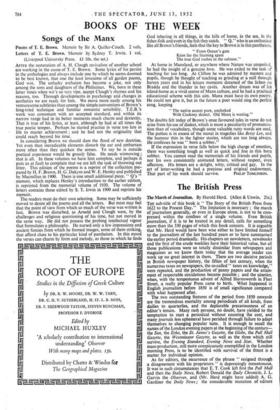BOOKS OF THE WEEK
Songs of the Manx
Poems of T. E. Brown. Memoir by Sir A. Quiller-Couch. 2 vols.
Letters of T. E. Brown. Memoir by S)dney T. Irwin.
(Liverpool University Press. 1 10s. the set.) AFTER the restoration of A. H. Clough revivalists of another school are working in the cause of T. E. Brown. Some lyrics of his persist in the anthologies and always include one by which he seems doomed to be best known, that one the least lovesome of all garden poems, God wot. The unlucky archaism has become a joke, not only among the sons and daughters of the Philistines. We, born in these latter times when wit's so very ripe, accept Clough's rhymes and his reasons, too. Through developments in psychology and changes in aesthetics we are ready for him. We move more easily among his venturesome subtleties than among the simple conventions of Brown's long-tried technique and familiar romantic sensibility. T.E.B.'s work was consonant with an accepted standard, and within its narrow range had in its better moments much charm and dexterity. That is true of his lyrics, at least, although he had at all times the true poetic temper. Perhaps he started practice in verse too late in life to master achievement ; and he had not the originality that could reach beyond his time. In considering Brown we should dam the flood of new doctrine. Yet even then ineradicable elements disturb the ear and embarrass more often than they quicken the senses. To say he is outside poetical experience would be grossly false. He needs winnowing ; that is all. In these volumes we have hini complete, and perhaps it puts us at fault to complain that we are left the task of throwing out litter. This edition of the poems is a reprint of the collection pre- pared by H. F. Brown, H. G. Dakyns and W. E. Henley and published by Macmillan in 1900. There is one small additional piece." Q's " memoir, which replaces Henley's introduction to the earlier edition, is reprinted from the memorial volume of 1930. The volume of letters contains those edited by S. T. Irwin in 1900 and reprints his memoir.
The readers must do their own selecting. Some may be sufficiently moved to desire all the poems and all the letters. But most may feel that the point of view from which so much of the verse was written is lost. Brown was disturbed, as Arnold and Clough were, by the challenges and religious questioning of his time, but not moved in the same way. He did not possess the probing intellectual vigour that formulates a philosophy. He nursed only a few impressions and ancient fancies from which he formed images, some of them striking, that afford clues to his particular kind of pantheism. In this mood the verses can charm by form and melody, as those in which he finds God inhering in all things, in the hills of home, in the sea, in the fisher-folk and even in the fish they catch. " Q," who is an enthusiast like all Brown's friends, feels that the key to Brown is in this pantheism, 1 vol. "From Ocean's gate Keen for the foaming spate The true God rushes in the salmon."
At home in Matucland, or anywhere where Nature was unspoiled, he had the insight of a genuine love. He was exiled to the task of teaching for too long. At Clifton he was admired by masters and pupils, though he thought of teaching as grinding at a mill through barren years and in his leisure moments dreamed of the lichen on Bradda and the thunder in her cava. Another dream was of his island-home as a vivid centre of Manx culture, and he had a practical educational scheme with this aim. Manx must have its own poetry. He could not give it, but in the future a poet would sing the perfect song, keeping
"The native accent pure, unchoked
With Cockney dialect. Old Manx is waning:" The doubts felt today of Brown's once favoured tales in verse do not arise from his use of dialect, which is more a peculiarity of pronuncia- tion than of vocabulary, though some valuable rutty words are used. The pathos is in excess of the moral in tragedies like Betsy Lee, and the humour thin in the lighter stories, which are too long always. He confesses he was" born a sobber."
If the expression in verse falls below the high charge of emotion, there was something tough as well as quick and fine in this born sobber. You cannot read the memorials of his friends and pupils, nor his own consistently animated letters, without respect, even affection. His letters are a delight, witty, critical and gay. In the art of letter-writing he had a precious and original endowment.
That part of his work should survive. PHILIP TOMLINSON.


































 Previous page
Previous page